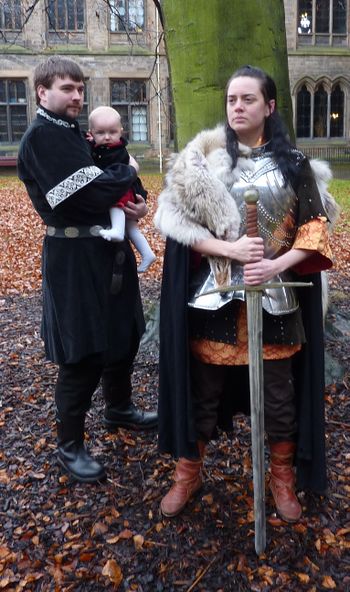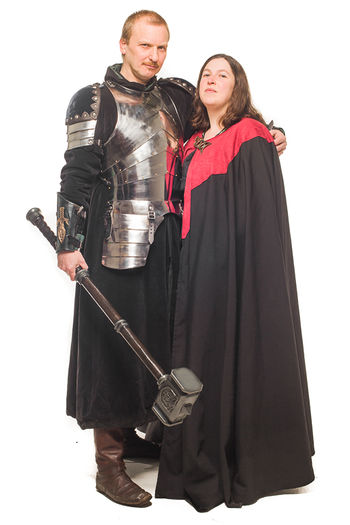Marriage in Dawn
Overview
In Dawnish minds, marriage is a solemn expression of true love, an ancient tradition that combines the potent hearth magic of love with the equally significant power of oaths. In Dawn, marriage is inseparable from love; nobles in particular are expected to hold themselves to the highest ideals and to marry only for love.
Many of the most glorious tales from Dawnish history, such as the arrival of the First Empress, concern themselves with love, marriage, and the associated test of ardour.
Love
Love is a powerful force in Empire, particularly in Dawn where it is widely recognised as a powerful hearth magic. Many Dawnish see love as every bit as important as glory, and ofttimes just as dangerous. As with glory, the troubadours pen songs and stories about love - remembering it, celebrating it. and invoking its power. Romantic love is the most common form of love that is immortalised in the troubadour's songs.
As a result, romance is a vital part of life in Dawn. The Dawnish pride themselves on their charm and good manners, they enjoy the act of courting for its own sake and many see clever flattery as an art-form. Flirtation is commonplace and widely accepted even among married Dawnish people, provided it does not lead to emotional entanglements. It is often seen as a harmless pastime, akin to the search for love, the way that a knight's sparring is akin the search for glory. But once a Dawnish citizen seeks more than passing pleasures, then they are expected to treat the challenge of love as seriously as they would the pursuit of glory - to woo the object of their affections, to demonstrate their depths of their love with a test of ardour, and thus to win their heart.
Romantic love is not the only form of love of course; a mother's love for her child can be every bit as powerful as romantic love for example. Expressions of platonic love are lauded by the troubadours every bit as much as romantic love and are also seen as a legitimate basis for marriage.
Yeofolk

Between yeofolk, marriage is generally a matter of two individuals going before a noble and asking them to bless their union. All nobles have the right to bless a marriage, and in Dawn it is considered to have the same weight as a binding contract elsewhere. Both spouses must repeat their vows and then consent to the union verbally three times before two witnesses, but nothing else is required. If a priest is present, it is usually a troubadour who has been asked to help with the preparation of the vows and the wedding celebrations.
In theory a noble may marry a yeofolk, but the yeofolk is not ennobled by the marriage and such unions are rare and difficult as a result. Dalliances between the nobility and yeomanry are frowned upon; it is beneath the status of a noble to love one who has not proved themself. Tales of yeofolk inspired by love to pass the Test of Mettle are a common legend however.
There are no tests of ardour between yeofolk, but the quest for glory stirs every true Dawnish heart. As such, some yeofolk who are courted will demand that their suitor prove their devotion by tasking them to first complete some feat of glory.
Nobility
Things are not so simple when nobles marry; one of the two must first pass the Test of Ardour to prove that they are consumed by true love and that they are worthy to join their intended's noble house. The suitor must pledge their troth to their intended. A request for marriage, like a request for a Test of Mettle, may not be refused (though an impossible and probably fatal test is the likely result if the feelings is not reciprocated). If the suitor succeeds then they marry their intended and become a member of their spouse's house.
Because of the unique nature of a Dawnish noble house, it is not acceptable for members of the same house to marry. There is a common taboo which forbids marriage between siblings in the Empire but the Dawnish extend this to members of the same house. This seems strange to outsiders but the Dawnish believe that the house is the family, that the relationship with an adopted brother or sister is more important that that between biological siblings.
Because of the restrictions, lovers who wish to wed must be members of different houses. Young lovers who have not yet taken their Test of Mettle must request a test from different houses to ensure this and then complete the Test of Ardour. This is considered wise by most Dawnish nobles - it prevents one of the parties completing their test and then pressurising their earl to set too easy a Test of Mettle for their paramour. Their intended must pass a test set by another earl, ensuring that their nobility is fully proven.
If two members of the same house fall in love the only way they can marry is for one to seek a Test of Mettle from another house. Traditionally a second Test of Mettle for a noble who has been thrown out of their house is impossibly difficult, but those whose requests are known to be motivated by love are sometimes not noticeably more difficult than a normal test. The Dawnish nobility well understand the affairs of the heart and do not punish people for seeking happiness. Of course the applicant must still pass a second Test of Mettle and then one of the two must complete a Test of Ardour. Such is the life of a Dawnish noble.

Troth
Like other nations in the Empire, most Dawnish folk take a relaxed attitude towards sexual relations between citizens. Dawnish people do not disdain physical expressions of sexuality; but most tend to view sex as a pleasant diversion that can be legitimately separated from ideas of romantic love. Still, the Dawnish would be the first to admit that affairs of the heart are complicated and the troubadours tales are rife with stories of jealousy and heartbreak.
When Dawnish couples consider marriage, however, they agree vows that define their expectation for their union. Assuming that the Test of Ardour is passed (for nobles), or the approval of a noble secured (for yeofolk), these vows will be spoken aloud at their wedding and form the basis of the union. Dawnish vows are as different as the citizens themselves. A commitment to sexual and romantic monogamy is common but not ubiquitous - Queen Igraine was famously polyandrous for example - and an oath to pursue glory at all costs is just as popular.
The language used in marriage vows in Dawn is expected to be uplifting, and to stir the passions of the heart. They are not legal texts intended to satisfy the clinical mind of an advocate. Skilled troubadours able to pen eloquent verse are often called on to help create the vows and sometimes to recite or perform them during the wedding.
What most Dawnish citizens expect from marriage is fidelity to the sacred vows by which they wed, an unswerving commitment to hold true to them at any cost. This can often set an impossibly high standard, but such is the way of life in Dawn. A noble who has sworn to love no other, but who then permits even a flicker of romantic affection for another to enter their heart has committed a heinous offence, a profound violation of the ethics of love, an inglorious act that offends the sensibilities of all who become aware of it.
Dissolution
The idea of a simple legal divorce is not widely accepted by the nobility of Dawn. Nobles may separate and lead distinct lives, but they remain members of the same noble house and the expectation is that they will both continue to abide by the vows they publicly swore to each other on their marriage. To do otherwise brings the offending party into disrepute.
In the extreme case that one or both spouses feels that they must seek the dissolution of their marriage, then the only way that can be achieved is to demand a Test of Resolve from their earl. On completion of the Test, the earl announces the dissolution of the marriage and the loser is ejected from the earl's house.
To be stripped of your noble status in this way is a terrible price to pay - but such is the seriousness with which the Dawnish view romance and love. What is sworn with oaths cannot be easily undone. The nobility of Dawn demand adherence to these highest ideals of nobility; those who want a simple life of pleasantries should remain yeofolk.